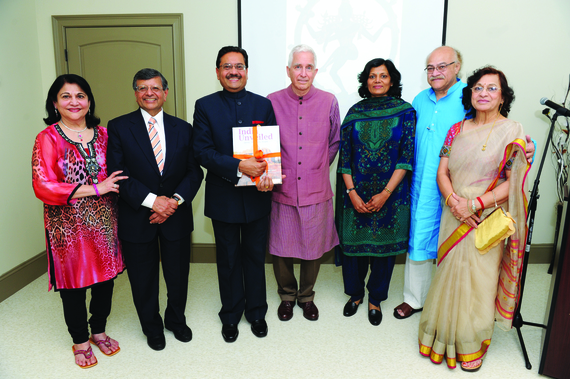Since the Hindu American Foundation (HAF) began its Hinduism 101 initiative last year, I have been fielded with requests from teachers and administrators across the country on what supplemental resources would be good for their schools.
As I've written before, most textbooks on Hinduism are woefully outdated and inaccurate, meaning that teachers are unable to give their students the best resources when it comes to learning about Hinduism. HAF's teacher training has helped to fill the void, but here are some age appropriate resources that might also help educators.
India Unveiled by Robert Arnett. Already in its sixth edition, Arnett's book is a timeless pictorial journey through India, offering rich visuals and highlighting the country's thousands of years of spirituality. While Arnett's book is more about India and its diversity (shown in vivid images of landscapes and religious shrines across the country) than religion, Hinduism - particularly its philosophical ethos - is centrally featured. In fact, Arnett, a historian and art expert who took many of the photos for the book, writes with the same intellectual curiosity of an anthropologist and the empathy of an expatriate. He was also aided ably by Smita Turakhia, an Indian-American who took over 50 photos, edited, and helped design the book. The book has become one of the most sought after resources on India, with the Los Angeles Unified School District recently ordering more than 100 copies of the book for its libraries. Another Arnett book, Finders Keepers?, is an award-winning title for children focused on the Hindu values of respect, honesty, devotion, and dharma as lived through the people of India. Illustrated by Turakhia, the book has been drawn international critical acclaim.
Arnett (center) at a recent book release of India Unveiled at the Indian consulate in Atlanta.
The History of Hindu India by the editors of Hinduism Today and Shiva Bajpai. Written as a textbook for grades 6-12, the history of Hindu India provides a detailed evolution of Hinduism's development in parallel and convergence with Indian history. Bajpai, a professor emeritus of history at California State University Northridge and one of the scholars who helped debunk the controversial Aryan Invasion Theory, worked with the Himalayan Academy and respected professors of religion such as Anantanand Rambachan, Jeffery Long, T.S. Rukamani, and Klaus Klostermeier to develop content that would explain the expanse of Hinduism's intellectual and cultural evolution over thousands of years. What makes the book valuable is that it's one of the only resources that sketches Hinduism from its early period to its contemporary forms across the world.
The Hindu Mind: Fundamentals of Hindu Religion and Philosophy for All Ages by Bansi Pandit. This popular book by Pandit is written with a logical and scientific explanation of Hinduism and its philosophies. What makes the book so valuable is that Pandit takes complex Hindu ideas and makes them straightforward for novices. Moreover, this book has been a template for many second- and third-generation Hindu parents in the United States to better explain the religion to their own kids.
Hinduism for Dummies by Amrutur V. Srinivasan. Srinivasan explains Hinduism in a way that most middle school students would be able to grasp without getting caught up in theological debates. This is an ideal "primer" book for public schools because of its readability and its sensitivity to separation and church and state.
The Complete Idiot's Guide to Hinduism by Linda Johnsen. Like Srinivasan, Johnsen takes a straightforward approach to explaining Hinduism, making philosophical and practical concepts within reach for most students. She writes with creativity and enough humor to keep the reader engaged for a basic understanding of the religion.
In sum, these books provide great context to better understanding Hinduism. They allow educators to have enough context to be able to confidently teach about Hinduism in the same manner they would about any other faith traditions. Moreover, with the success of these books, more grade and age appropriate works are sure to follow.
As interest in Hinduism grows, so will the number of resources on the religion.

